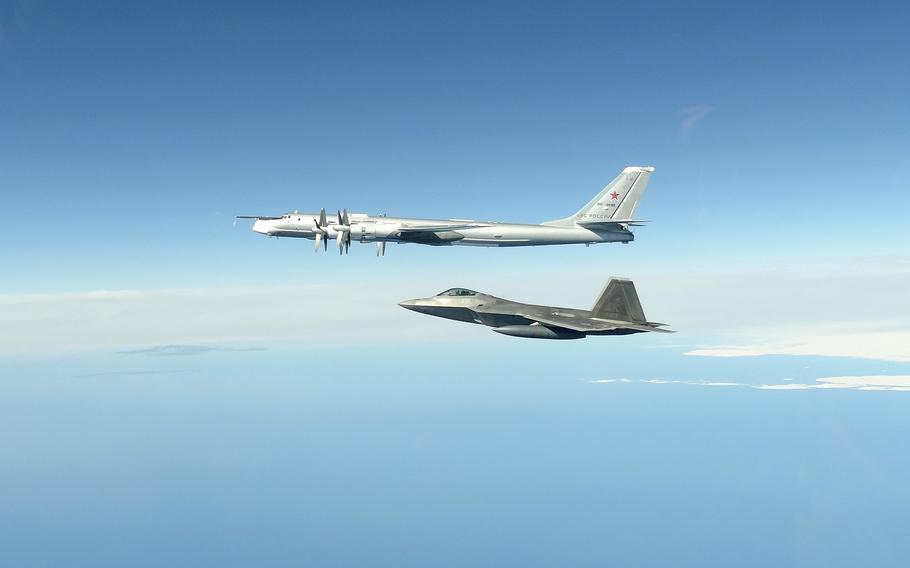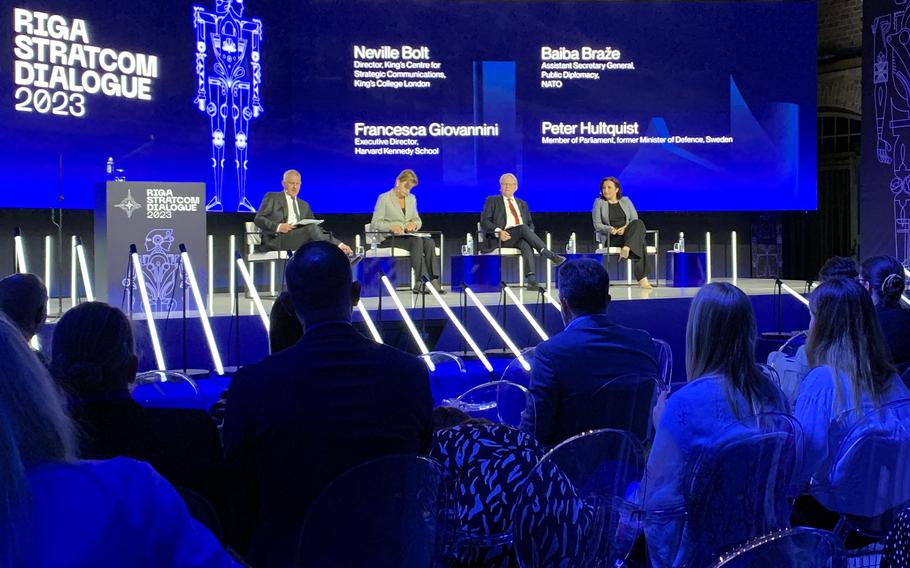
A North American Aerospace Defense Command F-22 Raptor intercepts a Russian Tu-95 Bear bomber over international waters off the coast of Alaska in 2020. Harvard University nuclear deterrence expert Francesca Giovannini says NATO and the U.S. are making too many assumptions when it comes to adversaries' willingness to fight a nuclear war. (North American Aerospace Defense Command)
RIGA, Latvia — The West is underestimating the willingness of Russia and other adversaries to use nuclear weapons to neutralize enemies and achieve battlefield goals, a top U.S. nuclear deterrence expert said this week.
The Cold War idea that the Kremlin, Beijing or another government never would wage nuclear war because it couldn’t win isn’t true any longer, said Francesca Giovannini, director of the Harvard Research Network on Rethinking Nuclear Deterrence.
An adversary may think using nuclear weapons is worth the risk in certain situations, Giovannini said. She described how Russia could escalate further in Ukraine, bringing the West to the brink of nuclear war.
“For years, we believed there was no interest in fighting a nuclear war,” Giovannini said Thursday in a panel discussion at NATO’s Riga StratCom Dialogue. “I am not too sure the adversaries feel the same.”
Giovannini and two other experts spoke to more than 100 military personnel, diplomats, government officials and others attending the two-day conference focused on redefining strategic communications in response to global crises.
The West’s opponents aren’t interested in arms control agreements and other similar Cold War rules that would limit their options, said Giovannini, also executive director of a program at Harvard University’s Belfer Center on dealing with the nuclear threat.
Other dangerous assumptions by NATO and the U.S. include ones that Russia or China would be open to communication during a crisis and that all leaders agree that humans always will oversee nuclear command and control, she said.

Harvard University nuclear deterrence expert Francesca Giovannini, far right, takes part in a panel discussion on the future of deterrence at NATO’s StratCom Dialogue in Riga, Latvia, on Thursday, June 8, 2023. (Alison Bath/Stars and Stripes)
China and Russia have not made that commitment, Giovannini said.
Those and other problems are making for a challenging environment as the U.S. and NATO confront an evolving post-Cold War nuclear arms race and determine how to best deter competitors, she said.
That new debate, however, is being directed by China, Iran, North Korea, Pakistan, Russia and other countries that are trying either to obtain nuclear weapons or increase their arsenals.
Those adversaries also are predators that believe they can grab whatever land they think is theirs, she said, adding that “the nuclear renaissance of today isn’t going to be shaped either by NATO or by the United States.”
Since launching its full-scale war on Ukraine in February 2022, the Kremlin has rattled its saber several times, including a threat to send tactical nuclear weapons to Belarus.
U.S. officials and military analysts acknowledge that the threats are credible but say it’s unlikely Russian President Vladimir Putin would follow through.
However, a growing number of analysts, including retired Army Brig. Gen. Kevin Ryan, believe Putin will use nuclear weapons in Ukraine, especially if Russian-occupied territory such as Crimea is threatened.
Western leaders don’t need to worry about crossing a red line in their support for Ukraine, Ryan wrote in a May 17 article for Russia Matters, a Harvard Belfer Center for Science and International Affairs project designed to improve understanding of Russia and the U.S.-Russia relationship.
“(Putin) has been building the conditions for nuclear use in Ukraine since early in the war and is ready to use a nuclear weapon whenever he decides, most likely in response to his faltering military's inability to escalate as much as he wishes by conventional means,” said Ryan, now a senior fellow at the center.
Deterrence is complicated further when it comes to the U.S. developing a strategy to address Russia and China, Giovannini said.
The U.S.-Russia relationship will be dominated by nuclear deterrence, she theorized. But that approach could destabilize the relationship with China, which would react to a U.S. nuclear weapons buildup with one of its own, she said.
The challenge will be in how to respond to two rivals who require separate but potentially conflicting approaches to deterrence, she said.
“Nuclear deterrence today is a fundamental arms race,” Giovannini said. “We already are in one.”